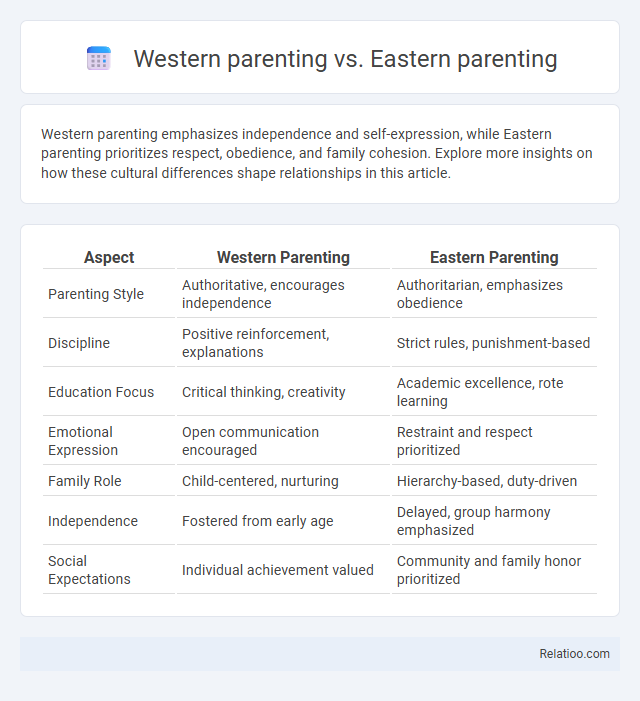Western parenting emphasizes independence and self-expression, while Eastern parenting prioritizes respect, obedience, and family cohesion. Explore more insights on how these cultural differences shape relationships in this article.
Table of Comparison
| Aspect | Western Parenting | Eastern Parenting |
|---|---|---|
| Parenting Style | Authoritative, encourages independence | Authoritarian, emphasizes obedience |
| Discipline | Positive reinforcement, explanations | Strict rules, punishment-based |
| Education Focus | Critical thinking, creativity | Academic excellence, rote learning |
| Emotional Expression | Open communication encouraged | Restraint and respect prioritized |
| Family Role | Child-centered, nurturing | Hierarchy-based, duty-driven |
| Independence | Fostered from early age | Delayed, group harmony emphasized |
| Social Expectations | Individual achievement valued | Community and family honor prioritized |
Introduction to Western and Eastern Parenting
Western parenting emphasizes fostering independence, critical thinking, and open communication, often encouraging children to express their individuality and emotions. Eastern parenting traditionally focuses on discipline, respect for authority, and valuing family harmony, with an emphasis on obedience and academic achievement. Cultural influences significantly shape these approaches, reflecting broader societal values and beliefs that guide child-rearing practices across different regions.
Historical Roots of Parenting Styles
Western parenting styles often emphasize independence and self-expression, rooted in Enlightenment ideals of individualism and personal freedom that emerged during the 18th century. Eastern parenting approaches tend to prioritize collectivism, respect for authority, and filial piety, influenced by Confucian philosophy and centuries of hierarchical social structures. Cultural influences on parenting reflect historical sociopolitical contexts, where Western societies developed democratic values and Eastern societies maintained traditional, community-centered frameworks.
Core Values in Western Parenting
Western parenting emphasizes individualism, independence, and self-expression as core values, encouraging children to develop personal goals and critical thinking skills. In contrast, Eastern parenting often prioritizes collectivism, respect for authority, and academic achievement, reflecting deep cultural influences rooted in Confucianism and family honor. Your understanding of these differing core values can help navigate cross-cultural parenting approaches and foster balanced child development.
Core Values in Eastern Parenting
Core values in Eastern parenting emphasize respect for authority, family loyalty, and discipline, shaping children to prioritize collective well-being over individual desires. These principles often manifest in high academic expectations and adherence to cultural traditions, contrasting with Western parenting's focus on independence and self-expression. Your understanding of these cultural influences can enhance cross-cultural communication and parenting strategies.
Approaches to Discipline and Authority
Western parenting often emphasizes individual autonomy and reasoning in discipline, encouraging children to understand rules through dialogue, while Eastern parenting typically stresses respect for authority and collective harmony, using more hierarchical and sometimes stricter approaches. Cultural influence shapes these methods by embedding societal values such as independence in the West and filial piety in the East, affecting how parents exert control and foster obedience. Your approach to discipline may vary significantly depending on these cultural frameworks, impacting how children respond to authority and develop self-regulation.
Academic Expectations and Educational Attitudes
Western parenting often emphasizes fostering critical thinking and individuality in academic pursuits, promoting a balanced approach to education that values creativity alongside performance. Eastern parenting typically prioritizes high academic achievement and discipline, reflecting strong cultural expectations for rigorous study and respect for educational authority. Cultural influences shape these educational attitudes by embedding societal values, where Western cultures encourage self-expression and exploration, while Eastern cultures stress collective success and perseverance.
Balancing Independence vs. Collectivism
Western parenting often emphasizes fostering independence and self-expression, encouraging children to develop individual identity and decision-making skills. In contrast, Eastern parenting prioritizes collectivism, stressing family loyalty, social harmony, and respect for authority as core values. Cultural influence shapes these approaches by determining whether a society values personal autonomy or communal well-being, impacting parenting styles and children's social development.
Emotional Expression and Support
Western parenting emphasizes open emotional expression and encourages children to share feelings freely, fostering individuality and self-confidence. Eastern parenting often prioritizes emotional restraint and respect for family harmony, promoting collective well-being over personal expression. Your understanding of these cultural influences helps balance emotional support approaches, blending empathy with appropriate boundaries.
Impact on Child Development and Well-being
Western parenting often emphasizes independence and self-expression, fostering creativity and critical thinking in child development. Eastern parenting typically focuses on discipline, respect for authority, and academic achievement, which can enhance cognitive skills but sometimes increase stress levels. Cultural influences shape parenting styles deeply, impacting children's emotional well-being, social skills, and resilience by balancing autonomy with communal values.
Bridging Western and Eastern Parenting Styles
Bridging Western and Eastern parenting styles involves integrating Western emphasis on independence and critical thinking with Eastern values of respect, family cohesion, and discipline. This hybrid approach promotes balanced child development by encouraging self-expression while maintaining strong cultural identity and communal responsibility. Research shows that combining these methods can enhance emotional intelligence and adaptability in children across diverse cultural settings.

Infographic: Western parenting vs Eastern parenting
 relatioo.com
relatioo.com